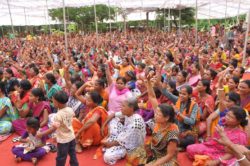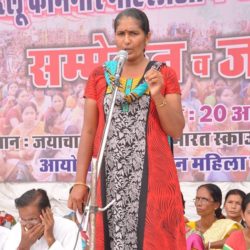October, 2020
In conversation with Meva Bharti, a social activist and the founder of the first women’s union in Rajasthan
5 minutes read
It’s tough to navigate the human world, for you never know when something ugly might be thrown at you. And only for pushing forwards in this tumultuous path, each of us should be counted a success story. But there are some stories that leave you with inspired optimism, with food-for-thought and just the right amount of motivation to finish what you take up.
One such story is that of Meva Bharti. Ms. Meva Bharti is a long-time social activist and Founder of Rajasthan Mahila Kaamgaar Union, which is the first women’s union in Rajasthan, based in Jaipur. To date, the organization has worked with over 18,000 women informal workers in organizing and pushing for their rights as employees. Here is an excerpt from our conversation with her (the conversation has been translated from Hindi to English for readers):
- Can you please share your journey of launching the RMKU?
I was always involved with initiatives that empower women and I was still studying, when I heard from my network about a horrific incident. It was a rape case of a 14-year-old domestic worker, who had been sexually exploited at her workplace and was pregnant. It really touched my heart as to how girls as young as she could be treated in such a manner. We filed a case for her, took her to court, and really fought so she could at least have a safe delivery. Throughout, the girl kept pleading with us to look for her two friends who were also domestic workers and at risk of the same kind of exploitation.
That’s when it struck me: there were so many women and girls out there, who were under grave threat within their own homes as well as those of their employers because little justice reaches them. Thereafter, I decided to do a survey of around 500 women to begin with, which took me over a year to complete. I studied their conditions, origins, and work profiles. For this survey, I was attached to Jagori as a Research Fellow. Once the report was ready, we also shared it with the Labour Secretary.
We were visiting and recruiting from several bastis across Jaipur. Eventually, the women we on-boarded themselves decided that we should unionize and since then, we’ve grown organically. Today, we operate in over 20 bastis across Jaipur, Ajmer, and Alwar. In fact, it is through these alliances that we realized that there were several kinds of informal workers who were women, besides domestic workers and so collectively, we decided to call it Rajasthan Mahila Kaamgaar Union.

- Since the launch of RMKU, how has life changed for you? In what ways have you grown as a person?
I have worked with women for as long as I can remember, even before RMKU happened. However, the collective power of a union has led to much faster change and at a level where no law and order agencies usually reach. The union and all the women who I work with have made me really believe that despite being told endlessly that we are the weaker gender, we are so strong! We go through so much: we’re inevitably made responsible for our households without a dime of appreciation, in addition to bearing some economic responsibilities. In fact, I have met domestic workers who are at work from 8 AM till nearly 11 PM and they hardly eat one square meal. So I have to ask the world, who are you calling weak?
- RMKU has now been functional for over a decade. What are the most important changes you’ve noticed among the women you work with?
At RMKU, we focus on three missions: Shashaktikaran, which means self-sufficiency. We want them to develop strength enough to feel confident in fighting for their rights and empowering others around them. Second, we work on awareness programmes so that more and more women would want to join us. And finally, we create government linkages so that we can directly put our demands before the decision-making bodies. We also have many yuva teams that help the families of the women with education for their children, basic healthcare, and a working PDS. This methodology has transformed the lives of the majority of these women who come from extremely rural areas— afraid of the chaotic city life, with no local support structures and little agency. An improvement in their lives directly correlates with an improvement in their family’s lives!
- All scaleable change can occur with support from the larger society. What has been the response of government agencies and the employers?
You know, we really think the Unorganized Workers’ Social Security Act, 2008 is a step in the right direction but there has to be more action. The office of the Labour Secretary has been quite responsive with reference to networking and registration of the domestic workers and local officers often visit our programmes.
Employers, on the other hand, are very extreme and a whole different ball game. Yes, there are some who are very supportive and helpful, like the ones who helped some women out with wages and ration during the Covid lockdown. However, there are others that we hear about from terrible cases of violence and harassment and it is very difficult to deal with them. Yet, we continue to reach out and build positive dialogues with them.
- What is the general conversation among the domestic workers attached to RMKU? What are their aspirations? Can you give us some examples?
Most of these women don’t really want to change their professions or do something drastically different. They tell me they had big dreams before they got married, but ever since, they have been forced to do domestic work due to economic constraints. They believe that now that they’ve entered the industry, they can’t turn back. In any case, we do have affiliations with several foundations that have trained some of our women to become taxi drivers, beauty workers etc. At the same time, our women want to be recognized and paid well for the work they do now so that their children do not have to be restricted to the same lives they have lived.
We see this attitude bringing huge changes among their kids and their mentalities. On the 12th of March, every year, we felicitate multiple domestic workers from our network and we also involve the media in these ceremonies. The families of the awardees are invited to the function and it is such a matter of pride for their kids! They feel good about the work their mothers/grandmothers/sisters do and some of them even actively help us out in our work at RMKU. Most of all, they begin to believe that they can have dreams too!
- What are the RMKU’s goals in the future? Are there plans to reach out to women domestic workers in other areas?
Yes, one hundred percent! To begin with, we definitely want to expand to all of Rajasthan. But more importantly, we want them to learn how to recognize and bootstrap the power within themselves. We want them to believe deeply, they are workers and they are women. And at RMKU, we know that if we change one person, we change their families, and then, we change society.
This is the reason that we involve their families in our grassroots level initiatives and programmes, especially because social horrors like domestic violence are still rampant in our communities! Everyone knows it happens, but there’s no way to track it and bring justice to the victims behind closed doors. So many women come out to speak to me just after being abused. Our women are resilient and they keep going, but this also comes from the acceptance that there is no other way to live. We want them to see that life can indeed be better.
- There is a lot more scope for the larger society to participate in this progress. How can civil society groups, common people, and private sector organizations help this cause in the future?
We have to get to every last woman and for that, each one of us has to take it upon ourselves to reach out to and support those around us. Of course, the messaging matters. Why are women the obvious and unspoken managers of the household? Why are they never told to focus on their studies and on housework later? We must focus on removing these male-female barriers and create a community where the roles aren’t pre-determined by gender, but earned by talent and practice.
- Mevaji, what about you? What does the future hold for you? Where do you see life going, with the RMKU?
My entire life, I have worked for women, with women. I will continue to do this work forever and I am so glad that we have been able to design as potent a tool as RMKU to do it more effectively. My target is a community where the women are neither restricted to their own four walls or harassed and mistreated in other homes!
~
As we spoke to Mevaji, we noticed a certain effortlessness in her demeanor. She is empowered with a rare synergy of ideas and actions and there’s just no wonder that her work has had such a life-changing impact on so many lives. She’s a feminist for all classes and communities of women, and how!
About the expert

Meva Bharti is a Jaipur- based social activist and the Founder of Rajasthan Mahila Kamgaar Union (RMKU). She brought together over 18,000 women domestic workers to claim their rights and establish their identity as workers. She brought them on a common platform where they could share their experiences and brainstorm for solutions to their problems. Apart from problem solving, the forum actively spreads awareness regarding various social schemes and how to go about doing the paperwork for key government documents like a ration card or Above/Below Poverty Line (APL/BPL) cards, which are crucial to the survival of this largely migrant domestic workforce. Ms. Bharti says, “Most often the influential go scot-free and the abused woman is left alone to pick up the pieces. But as the once voiceless, faceless women of the RMKU have proven, even the most disadvantaged group can change their odds if they stand by each other.
References
- Remote interviews conducted by Women’s Identity and Progress

Leave A Comment